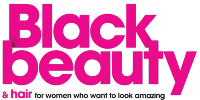Discover Asha Downes’ expert insights on growing healthy hair, tackling hair loss, and redefining afro hair care through science and coaching
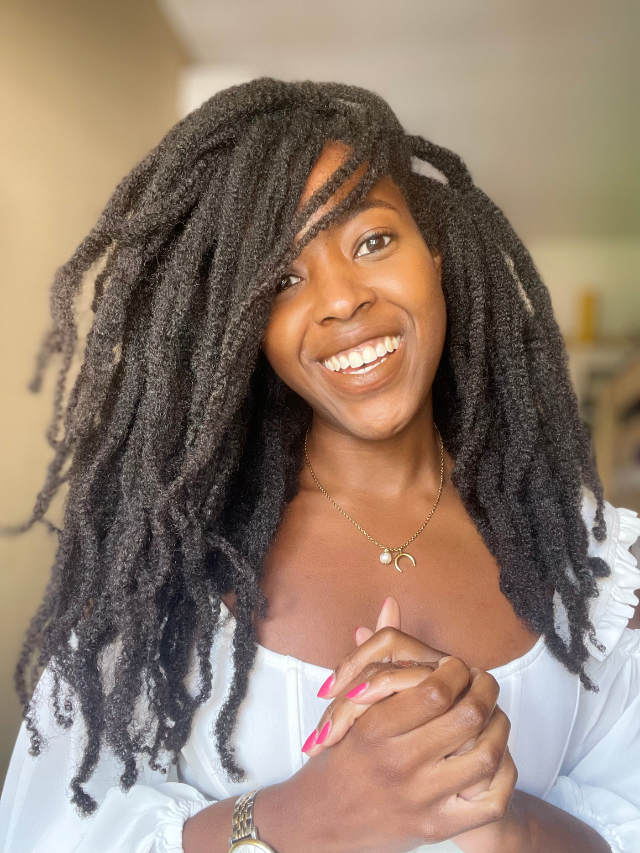
Asha Downes, MScCiT Clinical Trichologist and founder of Longer Lengths
Your hair is incredible. Have you always had long hair, or has it been a journey?
Thank you! It’s definitely been a journey. As a child, I actually thought it couldn’t grow beyond my shoulders because of my “genetics”. I had to completely unlearn this and relearn how to take care of my hair. What you see is the result of radical gentleness combined with patience and understanding.
What inspired you to become a hair coach and trichologist?
For as long as I can remember, I’ve been obsessed with hair, not just its aesthetics, but also the feel of it and how it interacts with different products. As a kid my mum would always be telling me off for playing in others’ hair, especially when those others were grown adults! This proclivity endured, and I started a public hair diary (a YouTube channel called Naturally High) while in 6th Form, where I documented my journey back to natural hair.
I went on to study a Molecular Biology BSc at Maastricht University, and an MSc at Utrecht University, hoping to one day get into hair science, but not really seeing a clear path ahead of me. After my MSc, I moved to Switzerland, learnt German and worked in diagnostics.
When the pandemic hit in 2020, I was stranded in Trinidad; my diagnostics contract had ended, and I decided it was time to make this “hair thing” my main thing. The original idea was to sell cosmetics, but with global supply chains hindered due to COVID, my stopgap regimen-building consultations seemed to be leading somewhere more longstanding and practical.
I hopped on networking calls with trichologists, cosmetic scientists and hair biologists, immersing myself in the hair science community, and joining conferences on the state of the art.
I also enrolled with the CTSP (College of Trichological Science and Practice). Essentially, I was following my dream to specialise in hair, and working with beta clients for the first cohort of my coaching programme, Longer Lengths.
At the same time, insights into my personal life helped me see connections between accountability, nutrition, self-acceptance, and natural hair confidence. This interplay between my own self-learning from journaling, therapy and coaching, and the foundation I was building in hair science underpinned the curriculum I was leading my clients through, which was designed to help them turn their natural hair from a burden into a luxury.
Tell us about your own hair story. Have you ever experienced challenges like breakage or hair loss?
I have! It’s funny. I must’ve blanked out this memory: the question suddenly took me back to being around six years old, and having small bald patches on my parietal scalp. They eventually disappeared, fortunately. Even as a trichologist now, I don’t know what they were – I’d need to examine my past self’s scalp and do a full history…
When I consider the signs & symptoms I remember and narrow it down, the candidate conditions would have been seborrheic dermatitis (essentially dandruff, which can cause hair loss in extreme cases), tinea capitis (ringworm – more common in children), and alopecia areata (a spontaneous form of autoimmune hair loss, which can resolve just as spontaneously). My mum took me to the doctor, and I eventually got better.
“Afro hair is not inherently strong; it’s delicate and needs softness and intention to thrive”
Other than this, I have dealt with extreme breakage, but it’s the kind that can be invisible when normalised: the reason my hair couldn’t get longer wasn’t my breakage – it was actually my genetics! Tightly coiled hair simply couldn’t get that long. Those wisps of hair that fell to the floor every time it was combed had nothing to do with my stagnant length, despite my never getting a haircut. What a paradigm shift it was learning the role breakage plays in length potential!
What does your day-to-day work as a hair coach and trichologist involve?
I love this question – other than doing founder admin and nerding out on hair science literature (I’ve got over 33 scholarly articles open as we speak), here’s what I spend my days on:
- Checking in with my Longer Lengths clients to make sure they’re staying on track, and helping them overcome daily hurdles that might otherwise make them give up
- Creating content for my social media and clients
- Writing up trichology management plans – these are the personalised reports I create after I see a client, which give them clarity on what we saw in the consultation and what their next steps could be
- Discussing complex cases with other professionals in my network
How do you support clients? Do you work one-to-one or via digital programmes?
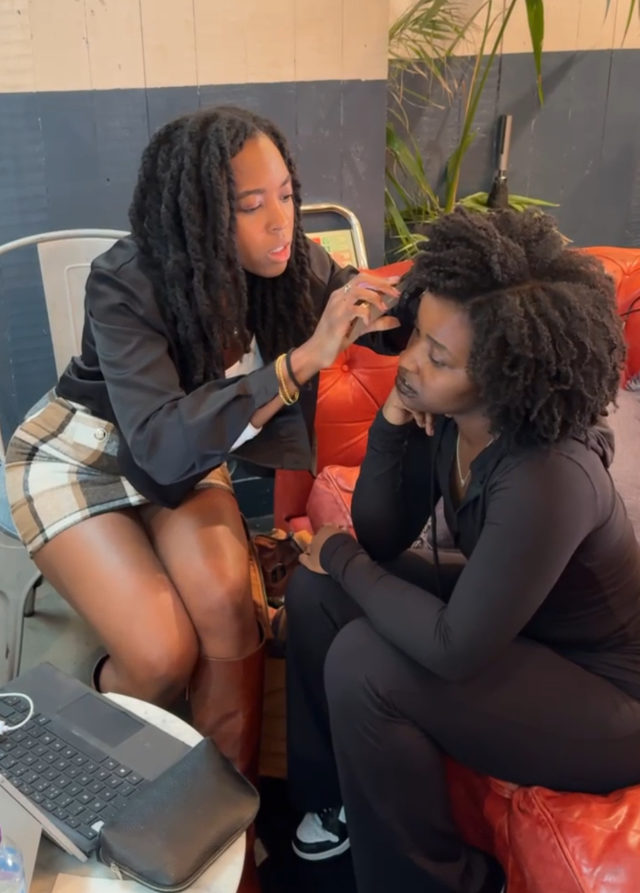
For Longer Lengths, it’s a combination of these and also VIP group calls. My clients have access to the exclusive library of Longer Lengths materials, which walks them through the LONG model – Love, Observe, Nurture and Grow, which is the basis of the programme. They also have a personalised portal where we track their progress together. Some of the sessions are one-to-one to allow for deeper exploration, and the group sessions are for accountability; they also create a sense of community.
Trichology consultations are one-to-one, and include history taking, a thorough examination and an explanation of the presenting conditions(s) and possible next steps. Depending on the client, we may also employ therapies like platelet-rich plasma, microneedling, Tricopat and scalp hydrafacials.
Basically, there’s never a dull moment!
What are the most common concerns you hear from clients?
My clients typically have issues around making time for their hair amidst everything else they have going on, figuring out how to look after their hair in a backdrop of conflicting tips on social media, not knowing why they’re losing their hair and being at their wit’s end, relying solely on wigs and weaves, even though they’d love to be wearing their natural hair more, scalp complaints, like itching and flaking; breakage that won’t let up and a sense of “unmanageability” with regards to their hair – they’re simply “too busy” for it.
Hair loss can be deeply emotional. How do you approach these conversations with empathy?
Don’t you know it! Honestly, it’s hard, but I’m so honoured that my clients choose to get my guidance on their journey and that anchors my conversations. Fortunately, a few forms of hair loss can be resolved, and even those which are permanent – like scarring and androgenetic alopecia – can be treated when caught early. Even though it’s bad news, there’s often quite a bit of hope, and their hair loss is often an opportunity to tend to internal issues they hadn’t been aware of, such as deficiencies and poor gut health. In this way, their understandably devastating hair loss can become a portal to their feeling better overall!
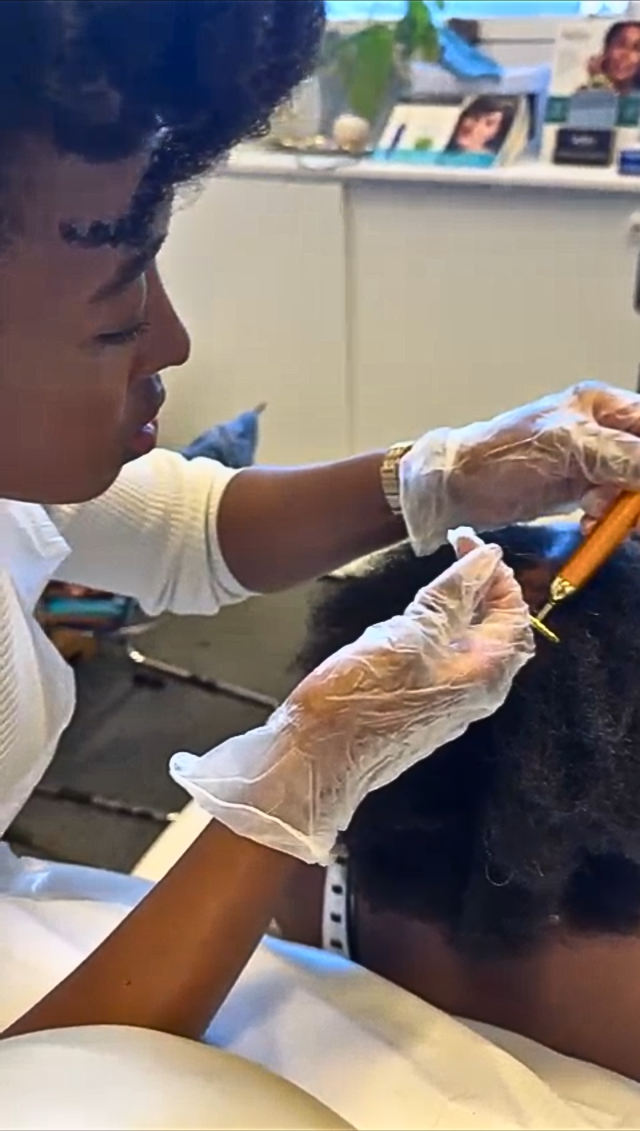
What advice would you give to someone starting their healthy hair journey?
My mind exploded at this question because who is this person? How old are they? What’s their hair like? Do they like it? What do they mean by “healthy”? Do they want it to grow long? Have they had long hair in the past? What were they thinking of doing? Do they have scalp issues? What about their gut? Do they have allergies? Where do they live? And so many more…
So, at the risk of giving generic advice, here’s what I’ll say. Hair can only be preserved or destroyed. Your hair is a dead material that covers your scalp, and, if you’re lucky, your whole body. If you want to grow and retain it:
1) Ensure you have a solid foundation internally, so that your fabric can grow strong and durable; 2) Take care of it in such a way that it does not weather fast. Consider how your comb, styling habits, friction against your clothes, tension, the wind, and other factors might shorten its lifespan. Mitigate these factors, so it can last longer.
3) If you’re struggling to be consistent with (2, figure out why and address the root causes. Do you have issues around “appropriateness”? Might you subconsciously see your hair as “unkempt” or “unmanageable”? Is that why you can’t get out of the cycle of breakage? If you don’t address this, your results likely won’t be sustainable.
You’re collaborating with UKHAIR as part of their Experts in Residence series. What does that involve?
Yes. I’m due to be featured in UKHAIR’s June Experts in Residence series, which spotlights clinicians in the hair and scalp space. It will involve content creation and sharing my views and experience in the world of hair and scalp health.
What’s your own hair care routine like? Any go-to products or techniques?
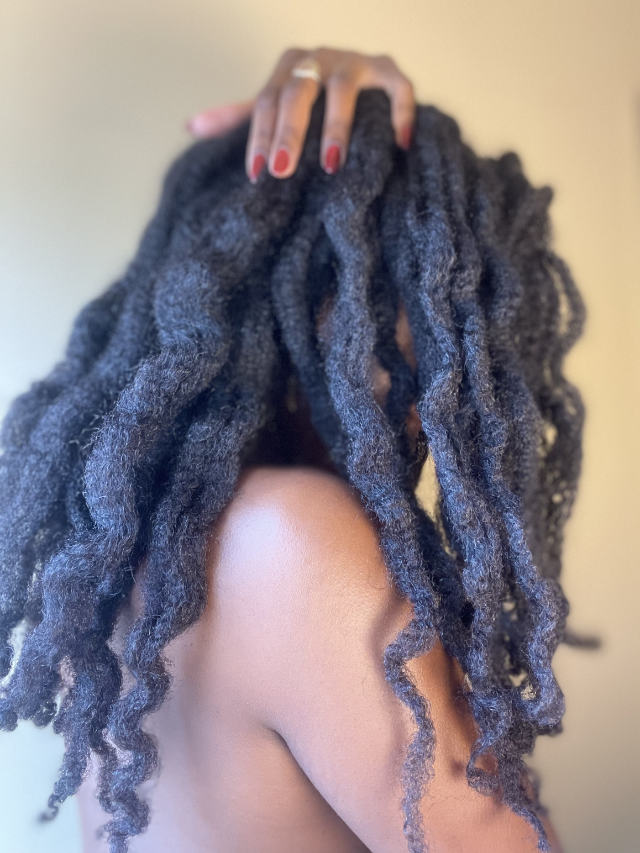
It’s simple yet effective and unexpectedly cathartic – I love it. I’ve designed it so that things get easier for my future self, not harder. I preserve my partings, often wear my hair in “clumps”, which gives the appearance of loose hair while keeping it protected. My favourite leave-in is Mixtress J’s Irish Moss Leave-in. It’s full of fatty ingredients along with slippery ones and film-forming humectants, which make my hair feel sustainably soft. I now blow-dry my hair after virtually every wash, which cuts down on the feeling of “washday” purgatory I used to experience with post-wash wet hair that needed to be stretched. And I love keeping my ends elongated by end-wrapping with a soft butter.
What myths about afro/textured hair would you love to bust?
Hmmm, a few – it’s not inherently strong, so “tougher than Nigerian hair” shouldn’t be a thing. It’s actually delicate and requires softness and intention for length retention, if that’s the goal. It’s not “difficult” or “unmanageable” unless you view it through an “outsider’s” lens, or don’t know how to get the result you want. It simply is what it is. You don’t “have” to straighten it or wear wigs or weaves for it to be “professional”. For me, seeing one’s own hair as impractical only makes sense if there’s a standard by which hair is “supposed” to abide. I once heard a coach say, “you’re ‘shoulding’ all over yourself – stop that!” This is the hair you grow. What are you going to do about that?
Do you have any exciting projects coming up?
I have a new cohort of Longer Lengths starting in the summer – that should be fun! I’ve trained in some new scalp therapies, such as platelet-rich plasma, microneedling, and Tricopat (a painless novel hair loss therapy combining microinflammation, massage, red light and growth factors) – so I’m looking forward to using these in-clinic.
I’m also going to Berlin for Karneval de Kulturen, which is my favourite place for blending my love of carnival with my penchant for languages. I’m going with friends I met in different places, and connecting for carnival is always nourishing.
Where can we find you?
To book a meeting with me to talk about Longer Lengths, click here.
You can find my Instagram here: @naturallyhigh__
And my YouTube channel here.
A shortened version of this article appears in the June/July 2025 issue of Black Beauty & Hair
